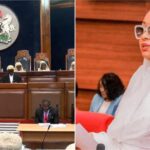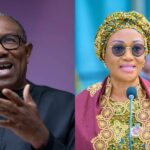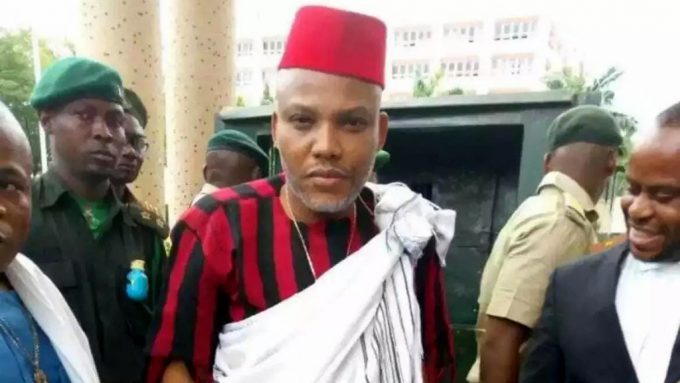George Wajackoyah, a counsel representing the detained leader of the Indigenous People of Biafra (IPOB), Nnamdi Kanu, said they have obtained evidence which shows that his client was kidnapped in Nairobi, Kenya.

KanyiDaily had reported how Nnamdi Kanu was arrested in Kenya and repatriated to Nigeria on July 27, in an operation conducted by Nigerian security operatives in collaboration with international partners.
Although the federal government did not state where Kanu was arrested, his brother, Kingsley Kanu, alleged that the IPOB leader was arrested in Kenya and “handed over to Nigerian authorities who then flew him to Nigeria”.
The United Kingdom had asked Nigeria to clarify the circumstances surrounding Kanu’s arrest after the Kenyan government denied involvement in the arrest and extradition of the IPOB leader.
Nnamdi Kanu Was Kidnapped In Kenya – Lawyer
Speaking with BBC, Nnamdi Kanu’s lawyer said that several findings indicated that the IPOB leader was in Kenya and that he had caught up with a friend at the airport on the day he was “kidnapped”.
“We have copies of his passport and a stamp that he was indeed in Kenya. We also have evidence he was in his residence on a particular day. We also have material proof that he was at the airport on a particular day to meet a friend and there he was arrested. Definitely, he was kidnapped,” Mr Wajackoyah said.
The lawyer also disclosed that a petition had been filed against the Kenyan government for its involvement in the “unconstitutional and unlawful” arrest and extradition of Mr Kanu.
“We filed a petition against the Kenyan government and various actors in this case for their unconstitutional and unlawful removal which denied our client his human rights, which was engineered by first to fifth respondents in the denial of fair administrative action and in the violation of human rights of Nnamdi Kanu,” he said.
The respondents are Kenya’s Interior CS, the Director of Immigration, the Director of Criminal Investigations, OCPD Jomo Kenyatta International Airport, and the Attorney General.
On how long the Kenyan government has to respond to the petition, the lawyer said “We are serving the respondents and from there, we take on. It’s not an issue of the Kenyan government responding but it’s a judicial matter,” adding that it was served under certificate of urgency.
Mr Wajackoyah questioned why the Kenyan government would “deport” a British citizen to Nigerian territory, despite the fact that Mr Kanu renounced his citizenship as a Nigerian.
Although he admitted that Mr Kanu could be extradited from Kenya, he argued that extradition has to follow due process which the Buhari regime refused to follow.
“You can’t just pick up somebody and throw him. That’s barbaric. It’s outlawed by international law even by our own constitution,” he explained.
“It is an abuse of the court process for the Nigerian court to try a British citizen who has no connection with Nigeria and without due process,” he added.
A July report published in The Guardian, a British outlet, also indicated that Mr Kanu’s UK passport remained in Kenya, after his extradition.
KanyiDaily recalls that Nnamdi Kanu had also dragged both Nigerian and Kenyan governments before the African Commission on Human and Peoples Rights over his arrest and extradition.


![White Groom’s Family Rock Igbo Attire, Display ‘Funny’ Dance Steps To Flavour’s Song [Video] 2 White Groom’s Family Rock Igbo Attire, Display ‘Funny’ Dance Steps To Flavour’s Song [Video]](https://media.kanyidaily.com/2021/09/18193416/oyibo-ft.x18159-150x150.jpg)










![“Why Do You Always Disturb Jarvis” – Odunlade Adekola Confronts Peller [Video] 23 “Why Do You Always Disturb Jarvis” – Odunlade Adekola Confronts Peller [Video]](https://media.kanyidaily.com/2025/09/22101718/Odunlade-Adekola-confronts-Peller-luyfjhvn-1200x600-1-150x150.jpg)




![Tems Meets Jay-Z And Beyonce At Roc Nation Pre-Grammy Brunch [Video] 31 Tems Meets Jay-Z And Beyonce At Roc Nation Pre-Grammy Brunch [Video]](https://media.kanyidaily.com/2023/02/05162506/Tems.jpeg)






![Buhari’s Aide, Onochie Reacts To Okorocha's Call For Reduction Of Nigerian Lawmakers [Video] 45 Buhari’s Aide, Onochie Reacts To Okorocha's Call For Reduction Of Nigerian Lawmakers [Video] 14](https://media.kanyidaily.com/2019/10/05104000/pjimage4.jpg)

